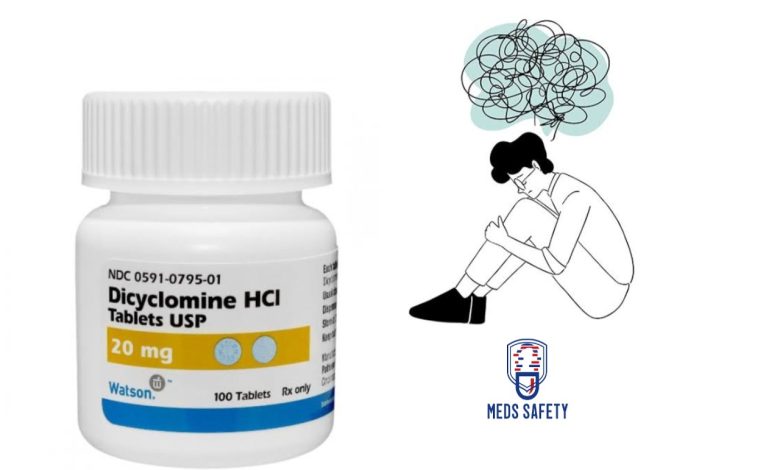Pros and Cons Of Using Dicyclomine for Anxiety

Anxiety is a common mental health issue affecting millions of people worldwide. While there are many traditional treatments and therapies available, some individuals seek alternative solutions to manage their anxiety. One such unconventional approach is the use of dicyclomine, a medication primarily designed to treat gastrointestinal issues.
In this article, we’ll explore the potential benefits and risks of using dicyclomine for anxiety and why it’s essential to consult a healthcare professional before considering such an approach.
What is Dicyclomine?
Dicyclomine, marketed under various brand names, is a medication classified as an anticholinergic and antispasmodic drug. It is primarily prescribed to treat gastrointestinal conditions, such as irritable bowel syndrome (IBS) and functional bowel disorders. Dicyclomine works by relaxing the muscles in the gastrointestinal tract, reducing cramps, spasms, and discomfort. This action can lead to symptom relief for individuals with IBS.
Dicyclomine operates by exerting its effects on specific muscles found in the stomach and intestines, known as smooth muscles. These muscles are responsible for the peristaltic movements required for the proper functioning of the digestive system. However, in individuals suffering from functional bowel disorders, such as irritable bowel syndrome (IBS), these smooth muscles can become excessively active, leading to uncomfortable and often painful spasms.
The key action of dicyclomine is to counteract these spasms by targeting and inhibiting the activity of acetylcholine, a neurotransmitter that plays a crucial role in muscle contraction within the gastrointestinal tract. By blocking the action of acetylcholine, dicyclomine helps to relax the smooth muscles in the stomach and intestines. This relaxation promotes a reduction in the intensity and frequency of the spasms, thereby alleviating the discomfort and pain associated with functional bowel disorders.
The Unconventional Use for Anxiety
While dicyclomine’s primary use is for gastrointestinal issues, some individuals have reported experiencing a reduction in anxiety symptoms when taking this medication. The rationale behind this unconventional use is based on the medication’s ability to relax smooth muscle, which includes muscle tissue found in the intestines, but also throughout the body.
Advocates for this unconventional approach argue that by calming the muscles in the body, dicyclomine may indirectly reduce the physical symptoms of anxiety, such as muscle tension, restlessness, and stomach discomfort. While anecdotal evidence suggests that dicyclomine may provide relief for some anxiety symptoms, it’s essential to be cautious and informed before considering this approach.
Potential Benefits
- Muscle Relaxation: Dicyclomine’s muscle-relaxing properties may help alleviate physical symptoms of anxiety, like muscle tension and gastrointestinal discomfort.
- Off-Label Use: The off-label use of dicyclomine for anxiety may be an option for those who have not responded well to traditional anxiety medications.
- Limited Side Effects: In some cases, individuals may find dicyclomine to have fewer side effects compared to other anxiety medications, though this can vary from person to person.
Potential Risks
- Lack of Clinical Evidence: Dicyclomine is not approved by the FDA for anxiety treatment, and there is limited scientific research on its efficacy and safety in this context.
- Individual Variation: The effects of dicyclomine can vary from person to person, and it may not provide relief for all individuals with anxiety.
- Side Effects: Dicyclomine can have side effects, including dizziness, drowsiness, dry mouth, and blurred vision, which may be challenging for some individuals.
- Drug Interactions: Dicyclomine may interact with other medications or substances, potentially leading to harmful effects.
Consultation with a Healthcare Professional
Before considering dicyclomine or any other unconventional approach for anxiety, it is crucial to consult with a healthcare professional. Your doctor can provide a comprehensive assessment of your condition, discuss the potential benefits and risks, and help you make an informed decision about your treatment plan.
Exploring Alternative Anxiety Management Strategies
Managing anxiety can be approached through various alternative strategies that are evidence-based and have proven efficacy in helping individuals cope with this common mental health concern. Here are some alternative options to traditional anxiety treatments:
1. Cognitive-Behavioral Therapy (CBT): Cognitive-behavioral therapy is a widely recognized and effective form of psychotherapy for anxiety management. CBT helps individuals identify and reframe negative thought patterns and behaviors that contribute to anxiety. It equips individuals with practical coping skills and strategies to manage and reduce anxiety symptoms.
2. Mindfulness Meditation: Mindfulness meditation is a contemplative practice that involves being present in the moment, focusing on your thoughts, sensations, and surroundings without judgment. Mindfulness has been shown to reduce anxiety by promoting relaxation, emotional regulation, and a greater sense of self-awareness.
3. Exercise and Physical Activity: Regular physical activity has numerous benefits for mental health, including anxiety reduction. Exercise releases endorphins, which are natural mood elevators. Engaging in activities like walking, running, yoga, or swimming can help alleviate anxiety and stress.
4. Dietary and Lifestyle Changes: Making adjustments to your diet and lifestyle can have a significant impact on anxiety management. Reducing the intake of caffeine and sugar, increasing water consumption, maintaining a balanced diet, and getting adequate sleep are lifestyle changes that can positively influence anxiety levels.
5. Herbal Supplements (with caution and professional guidance): Some herbal supplements have been explored for their potential in anxiety management. Herbs such as valerian root, passionflower, and lavender have shown promise in reducing anxiety symptoms. However, it’s crucial to consult with a healthcare professional before using herbal supplements, as they can interact with other medications and may not be suitable for everyone.
6. Breathing and Relaxation Techniques: Techniques such as deep breathing exercises, progressive muscle relaxation, and guided imagery can help calm the body’s stress response and reduce anxiety. These practices are accessible and can be incorporated into your daily routine.
7. Acupuncture and Acupressure: Traditional Chinese medicine practices like acupuncture and acupressure involve the stimulation of specific points on the body to balance energy flow. Some individuals find relief from anxiety through these practices, but it’s essential to consult with a trained practitioner.
8. Support Groups and Peer Counseling: Joining anxiety support groups or seeking peer counseling can provide a sense of community and understanding. Sharing experiences and strategies with others who have faced similar challenges can be empowering and comforting.
9. Biofeedback and Neurofeedback: These therapeutic techniques involve monitoring physiological processes and providing feedback to help individuals learn how to control their bodily responses to stress and anxiety. Biofeedback and neurofeedback are often used in clinical settings.
It’s important to remember that the effectiveness of these alternative anxiety management strategies may vary from person to person. For personalized guidance and treatment, consulting with a mental health professional is advisable. In many cases, a combination of different approaches, including some of the alternatives mentioned above, can be the most effective way to manage anxiety and improve overall well-being.
Conclusion
Dicyclomine is primarily prescribed for gastrointestinal issues, but some individuals have explored its off-label use for anxiety relief. While anecdotal evidence suggests potential benefits, it is crucial to approach this unconventional treatment with caution, considering the lack of clinical evidence and potential side effects. Consulting a healthcare professional for a comprehensive evaluation and discussing alternative evidence-based anxiety management strategies is advisable for individuals seeking relief from anxiety. Your mental health is a priority, and finding the right approach to manage it is essential.





